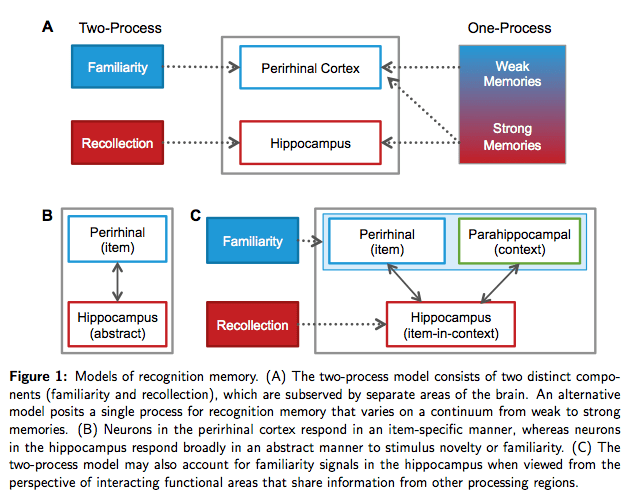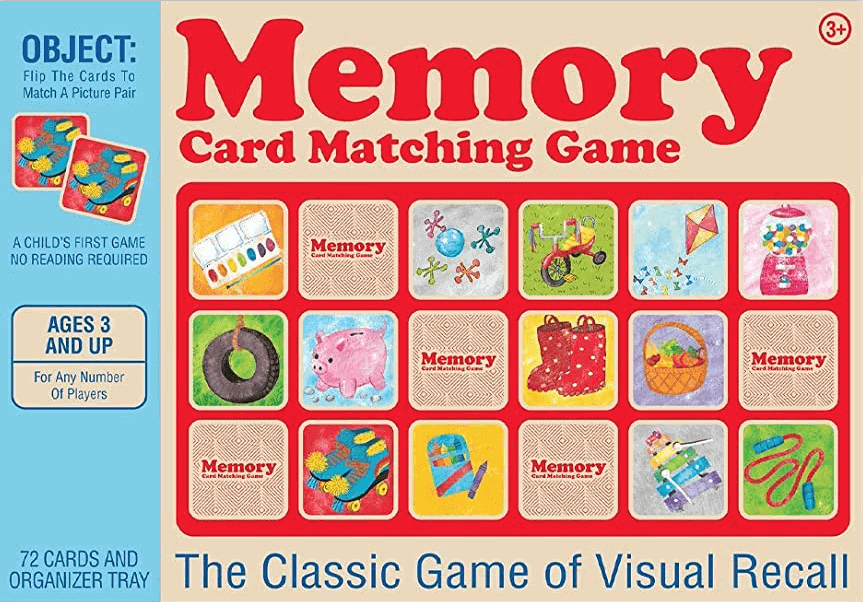Originally answered on Quora: What is the difference between recognition and remembering?
Recognition refers to the ability to distinguish whether a stimulus appears as familiar or novel, whereas remembering requires the ability to recall additional details and features, such as the context in which it was encoded. The question of whether the two classes of memory arise from a single graded process with respect to memory strength or exist as two distinct processes of memory has been a hotly debated topic.

Two-Process Model: Recognition and Remembering are Separate and Distinct
One of the widely accepted models for recognition memory arose from the observation that many patients with selective damage of the hippocampus appeared to have preserved recognition memory for identifying familiar items, but impaired recollection[1,2]. These individuals were most commonly tested by asking them to make “remember-know” judgments, which differentiates the feeling of knowing that an item has been seen before from the ability to remember the details. Double dissociations of recollection and familiarity have been observed in patients with lesions in either the hippocampus or surrounding perirhinal/parahippocampal areas[8]. Since damage to either respective structures in these patients had impaired recollection or familiarity performance – but not both – the results were strongly in favor of a two-process model (Figure 1A, left). Additional brain lesioning research in monkeys provided further support for the localization of these two classes of memory to distinct anatomical structures[1,3].
One-Process Model: Recognition and Remembering are One-and-the-Same
However, some patients with hippocampal lesions also exhibit impairments in recognition memory performance, in addition to the recollection impairments[2], which the classic segregated two-process model could not easily explain. On the other hand, the one-process theory posits that the nature of familiarity and recollection are one-and-the-same in the hippocampus and surrounding structures, varying on a continuum from weak to strong memory representations (Figure1A, right). Weak memories would allow the ability to recognize without being able to recollect additional details, while stronger memories would provide stronger signals for recall. This interpretation is in agreement with human fMRI results that have found graded activations in both the hippocampus and perirhinal area as a function of memory encoding strength[4]. Similar observations were reported from single-neuron recordings directly in the human hippocampus[5,6]. Further support for the one-process model has been provided by single-neuron recordings in the monkey hippocampus, which showed greater general responses to viewing novel items compared to previously seen items[7].
Note: This is an excerpt from a review paper that I wrote for one of my courses. I tried to change some of the language to make it easier to read, but do let me know in the comments if anything need to be clarified.
- M. W. Brown and J. P. Aggleton. Recognition memory: what are the roles of the perirhinal cortex and hippocampus? Nature Reviews Neuroscience, 2(1):61–62, 2001.
- Larry R. Squire, John T. Wixted, and Robert E. Clark. Recognition memory and the medial temporal lobe: a new perspective. Nat Rev Neurosci, 8(11):872–83, 11 2007.
- Sarah Nemanic, Maria C. Alvarado, and Jocelyne Bachevalier. The hippocam- pal/parahippocampal regions and recognition memory: insights from visual paired comparison versus object-delayed nonmatching in monkeys. J Neurosci, 24(8):2013–26, 2 2004.
- C. Brock Kirwan, John T. Wixted, and Larry R. Squire. Activity in the medial temporal lobe predicts memory strength, whereas activity in the prefrontal cortex predicts recollection. J Neurosci, 28(42):10541–8, 10 2008.
- Ueli Rutishauser, Adam N. Mamelak, and Erin M. Schuman. Single-trial learning of novel stimuli by individual neurons of the human hippocampus-amygdala complex. Neuron, 49(6):805–13, 3 2006.
- F. A. W. Wilson, I. P. Riches, and M. W. Brown. Neuronal activity in the inferomedial temporal cortex compared with that in the hippocampal formation: implications for amnesia of medial temporal lobe origin. Cellular mechanisms of conditioning and behavioral plasticity. Plenum Press, New York, pages 313–328, 1988.
- Michael J. Jutras and Elizabeth A. Buffalo. Recognition memory signals in the macaque hip- pocampus. Proc Natl Acad Sci U S A, 107(1):401–6, 1 2010.
- H. Eichenbaum, A. P. Yonelinas, and C. Ranganath. The medial temporal lobe and recognition memory. Annu Rev Neurosci, 30:123–52, 2007.
